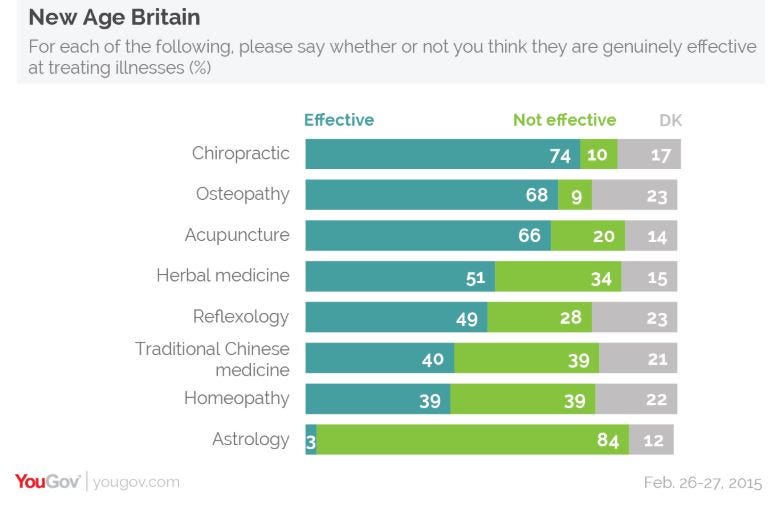The Risks of Alternative Medicine: Are We Misled?
Written on
The Dangers of Alternative Medicine
With a growing number of individuals turning to alternative therapies, is the misinformation regarding their efficacy truly a threat?
Defining Complementary and Alternative Medicine
Complementary and alternative medicine (CAM) encompasses a variety of medical treatments that are not typically recognized by the mainstream medical community, including practices like herbal medicine, acupuncture, and crystal healing. Many CAM techniques have ancient roots, with Chinese herbal medicine traceable to at least 2,000 years ago, and reflexology having origins in Ancient Egypt.
Research into these practices has often revealed that most do not deliver the promised benefits for the ailments they claim to treat. Exceptions include acupuncture, osteopathy, and chiropractic care, which have garnered support from the NHS in the UK due to clear evidence of their effectiveness. However, a notable number of people are increasingly turning away from conventional medicine in favor of alternative therapies, despite a significant absence of supporting evidence.
The Surge in Alternative Medicine Usage
While studies measuring the rise in alternative medicine usage are scarce, existing data indicates a clear upward trend. A study by Eisenberg, Kessler & Foster et al. (1993) revealed that 34% of American adults had utilized some form of CAM in the preceding year. A subsequent study in 1997 showed a 25% increase in usage. By 2015, the National Health Statistics Report found that one-third of Americans had sought alternative treatments.
In the UK, a YouGov study in 2015 demonstrated that a significant portion of the population believes in the efficacy of CAM therapies. The survey results reveal that the three most trusted forms of CAM—chiropractic, osteopathy, and acupuncture—are the only ones endorsed by the NHS.

The Dangers of Misinformation
The intersection of misinformation, desperation, and deception can lead to harmful outcomes. An illustrative example is Belle Gibson, an Australian blogger who falsely claimed to have cancer. She marketed her cookbook, "The Whole Pantry," stating that proceeds would be donated to charity, only to later reveal that she had never been diagnosed with cancer. Despite earning over $440,000 from book sales and app downloads, she was ordered to repay $410,000 for her fraudulent claims.
Moreover, celebrities wield significant influence over public behavior. For instance, when television presenter Noel Edmonds suggested that a cancer patient's illness could stem from their mindset, he misled many who might have been vulnerable to such advice. Therefore, celebrities must recognize their responsibility as role models, especially when discussing sensitive health issues.
Why Do People Turn to Ineffective Treatments?
Given the widespread agreement that most alternative therapies lack efficacy, what draws individuals to them? Britt Hermes, a former naturopath, shares her experience of disillusionment with conventional medicine after a negative encounter with a physician. Many people, disheartened by their experiences with doctors, seek out alternative therapies, often lured by promises of personalized care and extended consultation times.
Dr. Zubin Damania notes that the brevity of standard medical appointments leads patients to prefer naturopathy, which offers lengthy sessions filled with reassurances and holistic approaches. This environment fosters susceptibility to beliefs that align with their desires for healing.
The Human Cost of Misinformation
A staggering 40% of Americans believe that cancer can be treated solely with alternative therapies. This statistic mirrors findings in the UK, where many individuals hold similar beliefs about treatments like acupuncture and homeopathy.
Katie Britton-Jordan, diagnosed with breast cancer in July 2016, opted for alternative therapies, rejecting conventional treatments such as chemotherapy and mastectomy. Tragically, she passed away on May 25, 2019. Initially, her choice may seem baffling, but her vulnerability and fear of treatment side effects illustrate how easily misinformation can sway individuals.
The internet is rife with claims of miraculous cures, misleading articles, and dubious advice. While some alternative therapies may provide benefits, many others do not warrant time or financial investment—most importantly, they should not risk lives. The tragic case of Katie serves as a poignant reminder of the consequences of misinformation, leaving her child without a parent due to misplaced trust in ineffective treatments.
Assessing the Risks of Alternative Medicine
This video delves into the risks and dangers associated with alternative medicine, highlighting the importance of informed decision-making in healthcare.